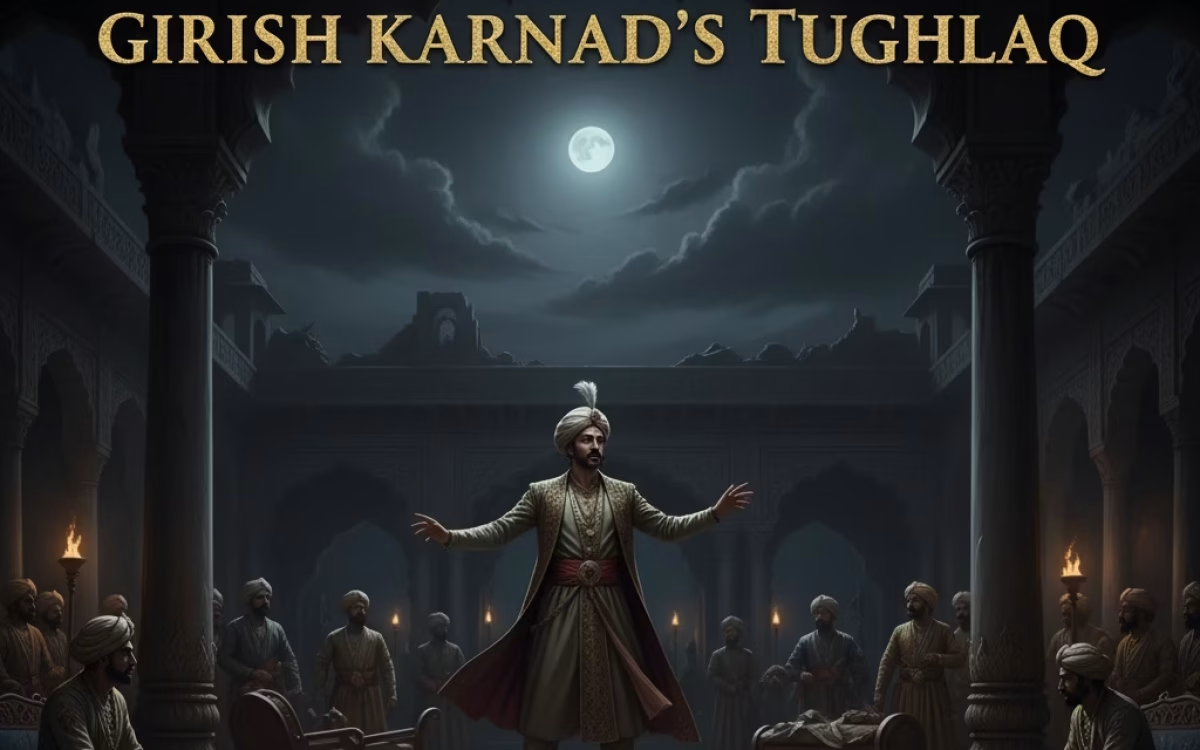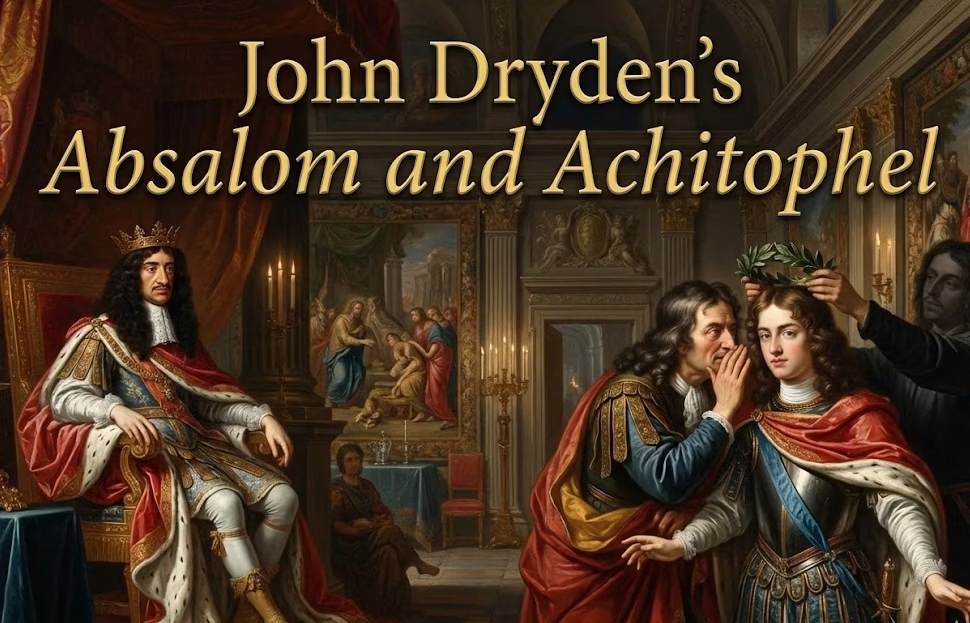Introduction
Girish Karnad’s Tughlaq stands as a milestone in Indian theatre, blending history, politics, and psychological complexity to create a play that resonates across generations. The play, first staged in 1964, unfolds in the 14th century and explores the reign of Muhammad bin Tughlaq, one of India’s most enigmatic and controversial rulers. Karnad’s work is not just a historical retelling but a profound exploration of leadership, idealism, and the tragic consequences of unchecked ambition. In this article, you’ll discover a detailed plot summary, character sketches, and critical insights that illuminate the play’s enduring appeal. Read More
Historical Context and Inspiration
The Real Muhammad bin Tughlaq
Muhammad bin Tughlaq ruled the Delhi Sultanate from 1325 to 1351 CE. His intellectual brilliance and radical reforms earned him recognition, but his decisions also caused chaos and suffering. He undertook ambitious projects during his reign, such as shifting the capital from Delhi to Daulatabad and introducing token currency, but both ended in disaster. Karnad uses these historical events as a canvas to explore the complexities of power and governance.
Karnad’s Motivation
Karnad wrote Tughlaq during a period of political turbulence in post-independence India. Leaders who, like Tughlaq, sought to transform society often embraced idealism but ultimately faced disillusionment when practical realities and internal conflict thwarted their efforts, as the play reflects. The parallels between Tughlaq’s reign and the challenges of nation-building in modern India are unmistakable.
Girish Karnad’s Tughlaq : Plot Overview
The Setting
Tughlaq unfolds in 14th-century India, a period marked by political upheaval and cultural transformation. The play’s backdrop is the Sultanate of Delhi under Muhammad bin Tughlaq, a ruler renowned for his intellect, ambition, and controversial decisions.
The Plot Overview
The narrative follows Sultan Muhammad bin Tughlaq as he pursues grand visions but makes tragic miscalculations during his reign. Tughlaq’s decision to shift the capital from Delhi to Daulatabad and introduce copper currency are central events that set the stage for chaos and disillusionment.
Act I: The Idealistic Monarch
The play opens with Sultan Muhammad bin Tughlaq presenting himself as a progressive and visionary ruler. He abolishes the jizya tax on non-Muslims, promotes merit-based appointments, and advocates for Hindu-Muslim unity. Tughlaq’s court is a place of intellectual debate, and he is admired for his knowledge and tolerance.
However, beneath this idealism lies a growing unrest. The Sultan’s reforms are met with suspicion and resistance. A group of conspirators plots to assassinate him during prayer, foreshadowing the tragic events to come. Tughlaq announces his decision to move the capital to Daulatabad and introduce copper currency, intending to strengthen his rule and promote unity, but his advisors and subjects greet these actions with skepticism.
Act II: Descent into Tyranny
As the play progresses, Tughlaq’s character undergoes a dramatic transformation. The forced migration to Daulatabad is brutally enforced, causing immense hardship. The Sultan’s paranoia grows as he faces assassination attempts and betrayal. His stepmother, once a figure of compassion, becomes embroiled in palace intrigue, and Tughlaq ultimately orders her execution for her involvement in a conspiracy.
Tughlaq’s trusted advisor, Najib, loses his life, which leaves the Sultan increasingly isolated. The failed currency experiment drains the treasury, and famine and rebellion sweep across the kingdom. Tughlaq’s dream of a just and unified state collapses as he resorts to cruelty and repression to maintain control.
Act III: Disintegration and Madness
The final act of the play depicts the complete disintegration of Tughlaq’s rule. The countryside is ravaged, and the people are disillusioned and destitute. Tughlaq is haunted by the ghosts of those he has killed, including his stepmother and former friend Ain-ul-Mulk. The Sultan’s mental instability reaches its peak as he becomes increasingly disconnected from reality.
In a final twist, Aziz, a cunning commoner who has manipulated the chaos for personal gain, is appointed to a position of power by Tughlaq. The play ends with Tughlaq falling into a troubled sleep, symbolising the exhaustion of his dreams and the tragic futility of his ambitions.
Girish Karnad’s Tughlaq : Character Analysis
Muhammad bin Tughlaq: The Tragic Hero
Tughlaq is one of the most complex characters in Indian drama. He is portrayed as:
Intellectually brilliant: A scholar and poet, Tughlaq is well-versed in philosophy, religion, and governance.
Idealistic: He genuinely seeks to create a just society, transcending religious and social divisions.
Fatally flawed: His impatience, pride, and inability to empathize with common people lead to disastrous decisions.
Psychologically complex: Tughlaq’s journey from idealist to tyrant is marked by inner turmoil, self-doubt, and eventual madness.
Karnad’s Tughlaq is both a visionary and a cautionary figure, embodying the paradoxes of leadership—compassionate yet ruthless, rational yet impulsive, a dreamer undone by his own ideals.
Aziz: The Opportunistic Counterpoint
Aziz, a dhobi (washerman), is a master of disguise and deception. He manipulates the system for personal gain, posing as a Brahmin and later as the Abbasid Caliph’s heir. Aziz’s character represents:
Survival and adaptability: He thrives in the chaos created by Tughlaq’s rule.
Moral ambiguity: Unlike Tughlaq’s lofty ideals, Aziz is pragmatic and self-serving.
Irony: His eventual appointment to power highlights the absurdity and failure of Tughlaq’s vision.
Aziz serves as a foil to Tughlaq, exposing the flaws in the Sultan’s policies and the unintended consequences of idealistic governance.
Barani: The Voice of Reason
Barani, a historian and close confidant of Tughlaq, represents traditional wisdom and caution. He often warns the Sultan about the dangers of his policies but is largely ignored. Barani’s presence underscores the importance of pragmatic counsel in leadership and the perils of disregarding experienced advisors.
The Stepmother: Personal Betrayal and Tragedy
Tughlaq’s stepmother is a figure torn between maternal concern and political intrigue. Her involvement in conspiracies and eventual execution by Tughlaq add a deeply personal dimension to the play’s exploration of betrayal and loss. She embodies the emotional costs of power and the tragic consequences of divided loyalties.
Najib: The Loyal Advisor
Najib’s loyalty to Tughlaq is unwavering, but his murder marks a turning point in the Sultan’s descent into tyranny. Najib’s fate highlights the dangers faced by those who serve power and the vulnerability of even the most trusted aides in a climate of suspicion and violence.
Supporting Characters
Other significant characters include:
Aazam: Aziz’s partner, representing the common man’s struggle.
Sheikh Imam-ud-din: A religious leader and critic of Tughlaq’s reforms.
Ain-ul-Mulk: Once a friend, turned enemy, symbolizing the shifting allegiances in Tughlaq’s court.
Ghiyas-ud-din Abbasid: A guest of honor whose murder further exposes the moral decay of the regime.
Girish Karnad’s Tughlaq : Thematic Exploration
Power and Governance
At the heart of Tughlaq lies a meditation on the nature of power. Tughlaq’s grand visions are undermined by his inability to translate ideals into effective governance. Karnad critiques:
Absolute power: The dangers of unchecked authority and the ease with which idealism can devolve into tyranny.
Disconnect from the people: Tughlaq’s failure to understand and address the needs of his subjects leads to alienation and revolt.
The responsibilities of leadership: The play serves as a cautionary tale about the ethical and practical challenges faced by those in power.
Idealism vs. Pragmatism
Tughlaq’s reign is defined by the tension between lofty ideals and harsh realities. His attempts at religious tolerance, economic reform, and administrative innovation are noble in intent but disastrous in execution. Karnad explores:
The limits of idealism: Visionary leaders must balance dreams with practical considerations.
The cost of failure: When ideals are not grounded in reality, they can lead to suffering and disillusionment.
Religious and Political Conflict
The play delves into the complexities of religious coexistence and political unity. Both Hindu and Muslim communities resist Tughlaq’s efforts to create a secular state, reflecting the challenges of forging national identity in a diverse society. Karnad’s critique of communal tensions remains relevant to contemporary India.
Betrayal and Isolation
Betrayal is a recurring motif—Tughlaq is betrayed by those closest to him, but he also betrays his own ideals and the trust of his people. The cycle of betrayal underscores the political instability and moral decay of the period. Tughlaq’s increasing isolation, both personal and political, is a central tragedy of the play.
Madness and Tragedy
The play’s structure mirrors Tughlaq’s psychological disintegration. His descent into madness is both a personal tragedy and a metaphor for the collapse of his vision. Karnad’s portrayal of Tughlaq as a divided self, haunted by guilt and regret, adds a profound psychological dimension to the narrative.
Girish Karnad’s Tughlaq : Symbolism and Dramatic Techniques
Symbolic Motifs
The Move to Daulatabad: Symbolizes the disruptive nature of radical change and the dangers of imposing utopian visions without regard for practical realities.
Copper Currency: Represents the perils of economic innovation without foresight and the fragility of trust in leadership.
Prayer and Religion: Used as both a tool of governance and a source of conflict, highlighting the interplay between faith and politics.
Use of Irony and Satire
Karnad employs irony to critique the gap between Tughlaq’s intentions and outcomes. The rise of Aziz, a commoner who manipulates the system, serves as a satirical commentary on the absurdities of power and the unpredictability of history.
Structure and Language
The episodic structure of the play mirrors the fragmentation of Tughlaq’s reign. Karnad’s language is both poetic and accessible, blending historical authenticity with modern sensibilities. Dialogues reveal the psychological depth of characters and the shifting dynamics of power.
Girish Karnad’s Tughlaq : Relevance to Contemporary Politics
Tughlaq is not just a historical play; it is a timeless commentary on the challenges of leadership, governance, and nation-building. The themes of idealism, disillusionment, and the dangers of authoritarianism resonate with political realities in India and beyond. Karnad’s critique of power and his exploration of communal tensions offer valuable insights for contemporary debates on secularism, democracy, and social justice.
Girish Karnad’s Tughlaq : Academic and Critical Reception
Tughlaq is widely studied in universities for its historical context, narrative technique, and philosophical depth. Scholars praise Karnad’s ability to weave together fact and fiction, creating a play that is both educational and dramatically compelling. The play’s enduring popularity is a testament to its relevance and artistic merit.
Girish Karnad’s Tughlaq :Stage Adaptations and Legacy
Since its premiere, productions have staged Tughlaq in multiple languages and settings. Directors often reinterpret the play to highlight its relevance to contemporary issues, drawing parallels between Tughlaq’s Delhi and modern-day India. The play’s adaptability and richness ensure its place as a cornerstone of Indian theatre.
Conclusion
Girish Karnad’s Tughlaq remains a masterful exploration of leadership, ambition, and the human psyche. Its blend of historical narrative, psychological insight, and political critique ensures its place as a classic of Indian literature. Whether you are a student, scholar, or theatre enthusiast, delving into Tughlaq offers valuable lessons on the complexities of governance and the enduring relevance of history. EXPLORE MORE AUTHORS
Frequently Asked Questions
What is the main theme of Tughlaq?
The main theme is the conflict between idealism and reality, as embodied by Tughlaq’s reign. The play examines how visionary leaders can become isolated and destructive when their ambitions outpace practical considerations.
Why did Tughlaq move his capital?
Strategic and symbolic motives prompted Tughlaq to shift the capital from Delhi to Daulatabad. He sought to unify his empire and demonstrate his authority, but the move ultimately led to widespread suffering and disillusionment.
How does Karnad portray Tughlaq’s character?
Karnad presents Tughlaq as a complex, tragic figure—intelligent and forward-thinking, yet fatally flawed by his inability to empathize with his people and adapt to changing circumstances.





